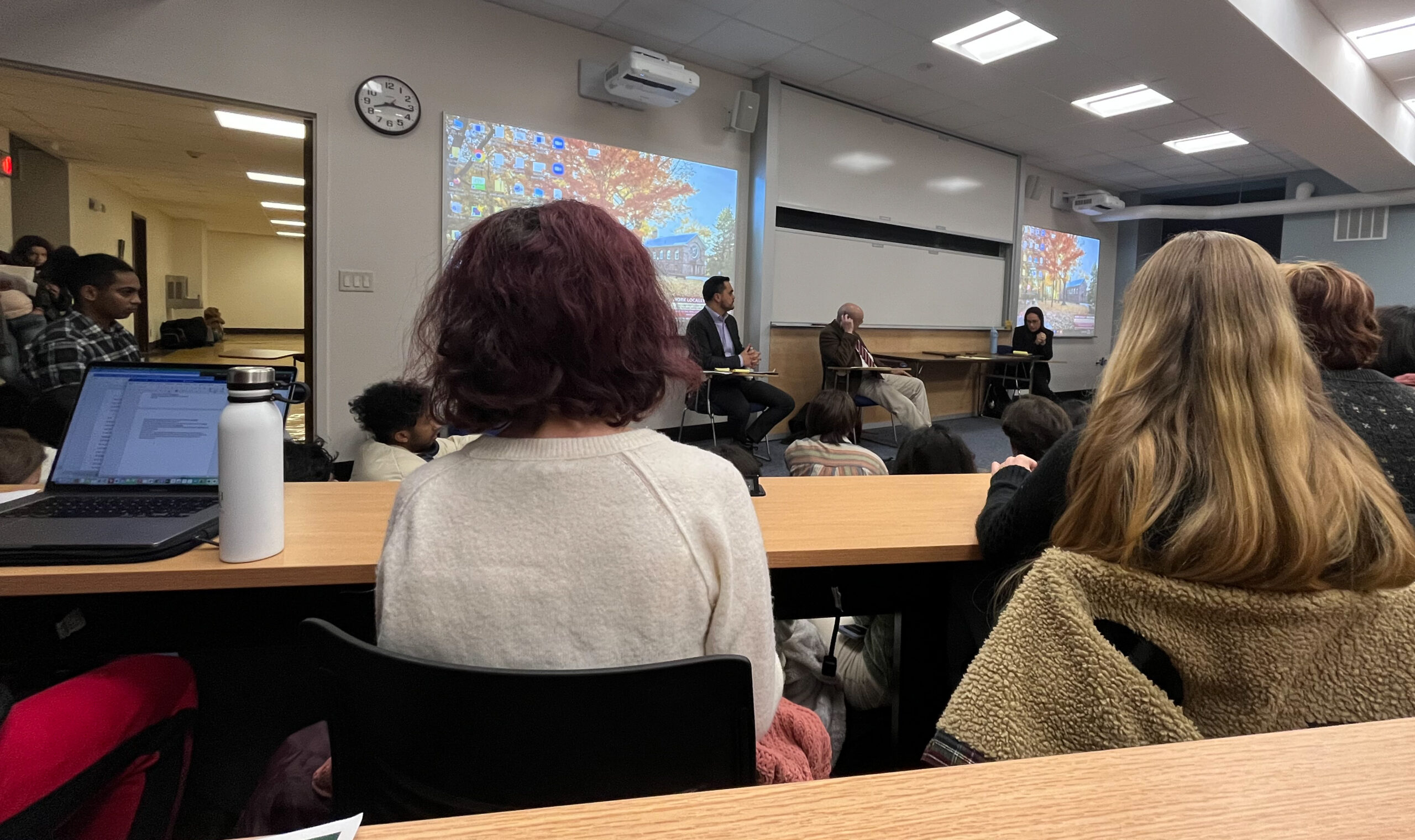Government Panel On Israel-Hamas Faces Scrutiny
Students lined the corridors of Hepburn Hall handing out informational flyers titled “All About Justice for Palestine” as others filtered into the Government Department’s Israel-Palestine panel. These students are the start of a new student organization that hopes not only to fight for justice for Palestine but also to facilitate emotional conversations and provide a safe space for students affected by recent events.
Almost two months after the initial attack on Oct. 7, 2023, the Government Department hosted a panel with three professors to discuss the current issues in Israel and Palestine. A significant number of students were concerned about the framing of this panel that was advertised by St. Lawrence University’s Government Department’s Instagram as a panel on “The International Relations of The Israel-Hamas War.”
During the Q&A portion of the panel, after thanking the professors for organizing and initiating the conversation, Eva Drummond ’24 brought ‘‘up what led many students to the panel. “I’ve heard you all talk about the Israeli-Palestinian conflict tonight, and what was advertised was talking about the Israeli-Hamas conflict.” Drummond addressed how the poster was interpreted by many students. “I think the conflation between Palestine and Hamas was wild on those posters, and it definitely sent a certain message since it was sponsored by the Government Department about maybe how it was going to be approached, which perhaps made people come into the room with certain ideas,” they said.
The concern about the panel was not just from students. “The event seems to entirely erase Palestinians from the conversation. The term ‘Palestine’ or ‘Palestinian’ doesn’t even appear on any of the text advertising the event,” said Somdeep Sen ‘07. After graduating from SLU, Sen got a Ph.D. in political science and is now the author of “Decolonizing Palestine: Hamas between the Anticolonial and the Postcolonial.” He wrote an email to the president and vice president of the university about his concern about the panel. Sen stressed the importance of using precise language when discussing this sensitive topic. “The language and vocabulary of our discussion on Israel-Palestine is of utmost importance,” he said. Sen also noted that the word conflict “makes it seem that what we are witnessing is simply two equal parties.”
Other students wanted to speak more about the emotions that arise with these conversations. “As someone who doesn’t necessarily know much about the politics of this issue, I did find this to be helpful in giving context for that,” said Kelsey Simler ‘25. Simler followed by saying that it might not be the right place to start the conversation and brought up what many thoughts were lacking from the presentation: empathy. “When you’re talking about innocent human lives, I feel personally it is more important to start from a conversation of empathy from the heart, who are other people, and I think that is what unites us more rather than talking about what political diversions already exist,” she said. The professors had a response to the perceived lack of empathy in the conversation.
“Part of our job, and it’s, it’s a hard part of the job, is to set aside our personal, emotional, turmoil and, some of us turmoil is the word, and still provide you know, empirical research,” responded Ronnie Olesker, chair of the government department. The panelists, including Olesker, Howard Eissenstat of the history department, and Mert Kartal of the government department, spoke on their expertise in each subject. After speaking on Israel-U.S. relations during the panel, Olesker stated that professors must separate their own feelings, whether political or emotional, when it comes to teaching. “Tonight, we’re presenting with our scholarly hats on, and tonight I’ll also go home and have a really, really good cry, truthfully,” Olesker said.
While there is a plan to continue the conversation in the spring, students are hoping there will be more conversations on the emotional side and more of an emphasis on the free Palestine perspective. “I don’t believe that hate can just appear out of the blue,” said Thamir Hashim ‘23, a student who attended the panel. “I feel like that also needs to be brought into the conversation, which would help the U.S. citizens as a whole to realize that there’s no real, there’s no real morality in sympathizing for Israel more than Palestine, in my opinion, because they’re both human.”



